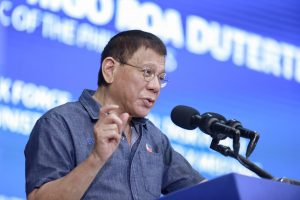Philippine President Rodrigo Duterte has barred his cabinet from publicly discussing the South China Sea dispute, after several ministers issued strong condemnations of the presence of Chinese vessels inside the Philippines’ Exclusive Economic Zone (EEZ),
In March, hundreds of Chinese boats, including maritime militia vessels, were spotted at Whitsun Reef in the Spratly Islands, prompting rebukes from key officials, including an expletive-laden tweet from Foreign Secretary Teodoro Locsin Jr.
“This is my order now to the cabinet, and to all and sundry talking for the government, to refrain from discussing the West Philippine Sea with anybody,” Duterte said in a televised address on Monday, using his government’s preferred term for the South China Sea. “If we talk, we talk but just among us.”
First discovered by Philippine patrols in the first week of March, the Chinese deployment in the Spratly Islands prompted a salvo of condemnations from Philippine officials, contradicting Duterte’s more accommodating policy toward Beijing.
On March 22, Defense Secretary Delfin Lorenzana issued a statement in which he called on Beijing ” to stop this incursion and immediately recall these boats violating our maritime rights and encroaching into our sovereign territory.”
Foreign Secretary Teodoro Locsin, known for his itchy Twitter fingers, drew on more colorful language to denounce the Chinese incursion. “China, my friend, how politely can I put it? Let me see… O… GET THE F*** OUT,” he wrote on Twitter on May 3. (Locsin later apologized for his tweet.) Roque told reporters on Tuesday that Locsin, as foreign secretary, was exempted from the gag order on the South China Sea issue.
These hawkish responses to the latest flare-up in the South China Sea have contrasted with Duterte’s more accommodating approach toward China in general, and the maritime disputes in particular.
After taking office in June 2016, Duterte decided to set aside the legal ruling of the Permanent Court of Arbitration in The Hague, handed down the following month, which found that China’s expansive maritime claims were invalid under international law, in the interests of tapping Beijing for much-needed infrastructure funding.
The rest of his term has been characterized by a familiar pattern, in which senior officials make hawkish statements by condemning Chinese actions in Philippine waters, while Duterte, wary of compromising economic cooperation with Beijing, has taken a more conciliatory line.
However, the Philippine leader later clarified his gag order should not be construed as weakness and on Tuesday said the country’s maritime patrols would persist. “Our agencies have been directed to do what they must and should to protect and defend our nation’s interest,” Duterte said in a statement. “We will not waver in our position.”
The most sympathetic reading of the gag order is that it is an attempt to craft a more coherent position on the disputes in the South China Sea. The problem, however, is that much of the incoherence stems from Duterte’s own style of politics, which, thanks to the peculiarities of the Philippine political system, given him considerable power to set the country’s foreign policy.
Over the past five years, the Philippine leader has blown hot and cold over the South China Sea. In September of last year, in a speech to the U.N. General Assembly, Duterte finally threw his support behind the PCA’s arbitral award, claiming that it was “beyond the reach of passing governments to dilute, diminish, or abandon.” Throughout the current stand-off, Duterte has mixed defenses of Filipino sovereignty with expressions of repeated his desire for the Philippines to maintain friendly ties with its “good friend” China.
Given the extent to which this incoherence originates in the presidential palace, there is good reason to believe that it will continue to bedevil the Philippines’ foreign policy for the remaining year of Duterte’s term in office.

































